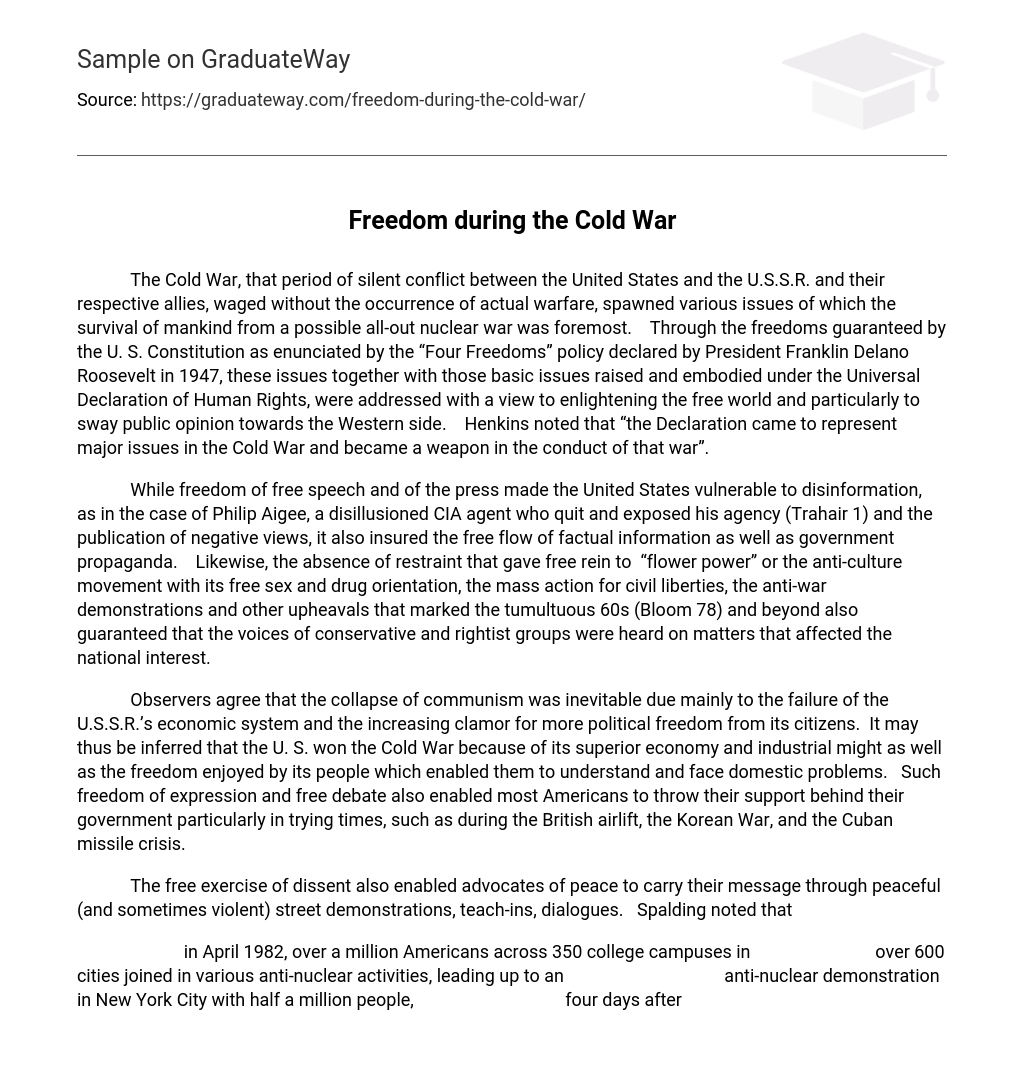The Cold War, that period of silent conflict between the United States and the U.S.S.R. and their respective allies, waged without the occurrence of actual warfare, spawned various issues of which the survival of mankind from a possible all-out nuclear war was foremost. Through the freedoms guaranteed by the U. S. Constitution as enunciated by the “Four Freedoms” policy declared by President Franklin Delano Roosevelt in 1947, these issues together with those basic issues raised and embodied under the Universal Declaration of Human Rights, were addressed with a view to enlightening the free world and particularly to sway public opinion towards the Western side. Henkins noted that “the Declaration came to represent major issues in the Cold War and became a weapon in the conduct of that war”.
While freedom of free speech and of the press made the United States vulnerable to disinformation, as in the case of Philip Aigee, a disillusioned CIA agent who quit and exposed his agency (Trahair 1) and the publication of negative views, it also insured the free flow of factual information as well as government propaganda. Likewise, the absence of restraint that gave free rein to “flower power” or the anti-culture movement with its free sex and drug orientation, the mass action for civil liberties, the anti-war demonstrations and other upheavals that marked the tumultuous 60s (Bloom 78) and beyond also guaranteed that the voices of conservative and rightist groups were heard on matters that affected the national interest.
Observers agree that the collapse of communism was inevitable due mainly to the failure of the U.S.S.R.’s economic system and the increasing clamor for more political freedom from its citizens. It may thus be inferred that the U. S. won the Cold War because of its superior economy and industrial might as well as the freedom enjoyed by its people which enabled them to understand and face domestic problems. Such freedom of expression and free debate also enabled most Americans to throw their support behind their government particularly in trying times, such as during the British airlift, the Korean War, and the Cuban missile crisis.
The free exercise of dissent also enabled advocates of peace to carry their message through peaceful (and sometimes violent) street demonstrations, teach-ins, dialogues. Spalding noted that
in April 1982, over a million Americans across 350 college campuses in over 600 cities joined in various anti-nuclear activities, leading up to an anti-nuclear demonstration in New York City with half a million people, four days after President Reagan’s address at Westminster [where he delivered hawkish remarks against the Soviet Union].
Randall Forsberg, founder of the Nuclear Weapons Freeze Campaign, gives credit to the “perseverance of citizen activists for peace and human rights” for making possible the end of the Cold War (Salla 118). The day-to-day commentaries of news analysts in the broadcast and print media, the presidential debates during election campaigns, the availability of reading materials from government and private sources on the issues involved also insured that people were adequately informed.
Although the liberal discussion of Cold War issues polarized America into various camps, the majority supported the government’s policy of containment and later, of nuclear deterrence. Some filmmakers and authors, notably John Le Carre and Ian Fleming, made millions out of their novels set in the Cold War. In a way, these served to reinforce the government propaganda to the effect that communists are out to unleash nuclear Armageddon on an unsuspecting world, and that the West should do its utmost to contain this evil. Thus, deterrence and war-fighting capability have remained central in America’s security strategy even after the end of the Cold War.
To most Americans who used to think of war as the pursuit of victory, the policy of containment which lay at the heart of American foreign policy vis-à-vis the Cold War, was difficult to comprehend. Adopted by President Harry S. Truman, it aimed to stop further Soviet expansion from Eastern Europe and to react with measured force whenever the communists decided to overstep its boundaries. Employed in the Korean and the Vietnam War, it sapped the protagonists of their strength, only to find themselves in the same stalemate before the start of these conflicts. Those who could not equate the death of their sons with a safer America took to the streets; a free atmosphere guaranteed them that right.
Being far better educated and exposed to liberal views, citizens of the United States and its Western allies were in a better position to influence their Soviet counterparts. The Cold War was, after all, a war of ideas. According to Tirman,
“the steady parade to the Soviet Union and Eastern Europe of ordinary citizens, diplomats, lawyers, doctors, scientists and a variety of dissident politicians created a dynamic front for détente” (13).
The Cold War has indeed ended but the underlying causes of all wars remain: “poverty, social inequality, ethnic tensions, population growth and environmental degradation” (Renner). Left unaddressed, these will result in polarization and inevitably violent conflict. Present and future generations may yet address these issues towards the abolition of war, if possible, but they would need the free exercise of their right of expression to attain it.
WORKS CITED
Bloom, Alexander, ed. Long Time Gone: Sixties America Then and Now. New York, Oxford University Press : 2001.
Henkins, Louis. “The Universal Declaration and the Cold War”. 05-03-06.
<http://www.apa.udel.edu/apa/archive/newsletters/V97n2/law/declaration.asp>
Renner, Michael. “How to Abolish War”: The Humanist. 59 4 1 Jul 1999.
Salla, Michael E. and Ralph Sunny, Ed. Why the Cold War Ended: A Range of Interpretations. Westport, CT, Greenwood Press : 1995.
Spalding, Elizabeth Edwards. “The Ash Heap of History : President Reagan’s Westminster Address 20 Years Later”. 05-03-06.
<http://www.reagansheritage.org/reagan/html/reagan-novel_spalding.shtml>
Tirman, John. “How We Ended the Cold War: Peace Activists Demand for an End to Nuclear Madness Played a Decisive Role” : The Nation. 269 14 Nov 1999.
Trahair, Richard C. S. The Encyclopedia of Cold War Espionage, Spies and Secret Operations. Westport, CT, Greenwood Press : 2004.





